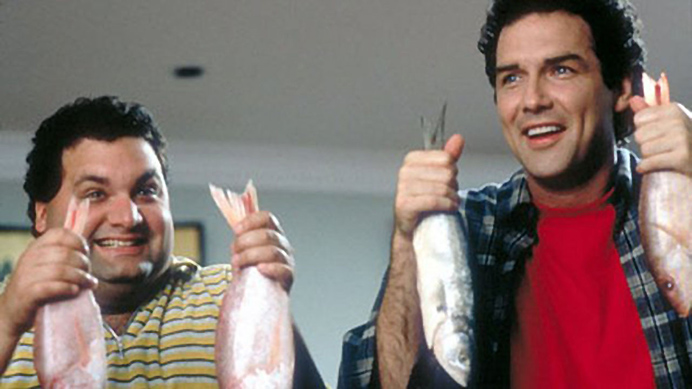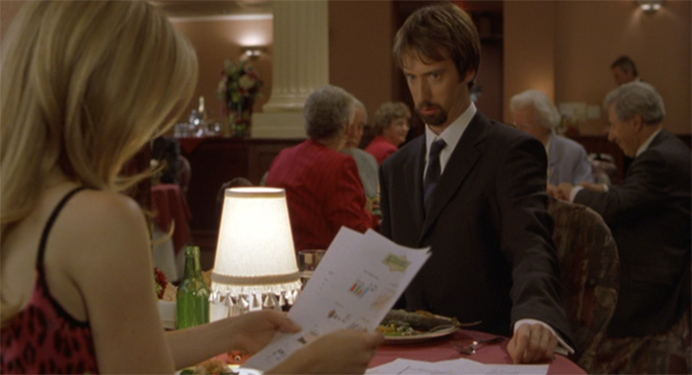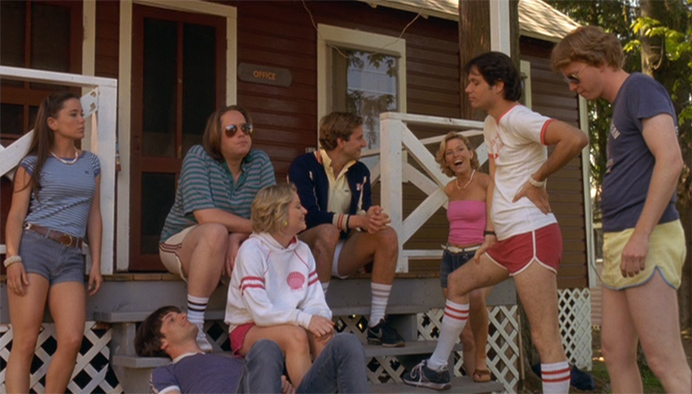
Jokes, almost inherently, aren’t funny. We all know scores of ‘classic’ jokes from the aristocrats to dead babies to chickens crossing roads. None of them are funny. But, in the right context, we’ll laugh at them, because the joke isn’t what’s funny—the idea of the joke being told is. It’s that extra layer, that prefix, that meta, that deeper meaning, which gives a joke life, and makes it funny, and makes you truly laugh. (Laughing simply because you’re ‘supposed to’ is why sitcoms are popular, despite their unfunniness.)
Sitcoms are not funny, from Parks and Rec right down to I Love Lucy (although Lucille Ball does have her moments on that show). Sitcoms can’t be funny because they are created by a system that works against comedy, utilizing a process known as homogenization—or, the process of making sure every joke is big and broad enough to be liked by a fifteen year old teeny bopper and her forty-five year old aunt (who, ironically, often have the same exact sensibility anyway). What’s more ironic is that bad shows like Parks and Rec and The Office end up getting championed by hip people because the use of handheld camera and ‘indie’ comedians tricks them into thinking that the jokes are funny. They aren’t.
What homogenization does is destroy the esoteric. The esoteric is where comedy happens. It is where the artist’s sensibility bleeds through, bringing you in on the idea of the joke. And it’s what makes stand-up comedy the hardest art form to do well, because it is about designing a truly great personality rather than merely writing good jokes. Since so few comics know anything about this, most of them suck automatically, because they’re literally just writing jokes, and jokes aren’t funny. On the flip side, some comedians cultivate such a radical personality that they’re wholly unlikable (like Andrew Dice Clay).
Every truly great stand-up comedian hits a sweet spot of great personality and great jokes. For example, Mitch Hedberg. His personality is earnest yet designed, and his jokes are lame yet smart. This tight rope is nearly impossible to walk, which is why there’s only about a dozen comedians in the history of stand-up comedy who have ever done it well. Literally. To name a few: Jerry Seinfeld, David Cross, Eddie Izzard, Ellen Degeneres, Louis CK, Chris Rock, Mitch Hedberg.
I listed Jerry Seinfeld first to make a point. Seinfeld is the only funny sitcom in history (unless you consider Curb Your Enthusiasm, which is funnier because it doesn’t suffer from the insufferable limitations of a sitcom, and has swearing and no laugh track). Famously, Jerry Seinfeld and Larry David were able to be artists in a homogenized world because Jerry didn’t care—he could always just go back and do stand up. Not caring helps a lot in comedy.
Don’t get me wrong, Seinfeld is littered with easy, unfunny jokes. (It’s a popular comedy show.) But, because Jerry and Larry were essentially allowed to do whatever they wanted, their voice shined through. And thus, the esoteric met the mainstream, and the result was the most popular and funniest show of all time.
For something to be funny, you have to hear the artist’s voice. You have to be in on the joke. The more you watch Seinfeld the more you’re laughing at the idea of what Jerry and David think is funny. This is also why Jerry’s little bits at the header of the shows are the least funny part of the show. Pill-sized observations by themselves are worthless. But those same jokes in the context of an hour-long special, or a storyline in the show, are funny, because they’re contextualized by an overarching theme and a relatable personality.
The modern master of this is Louis CK, who has cultivated one of the freshest stand-up personas in history. When he’s performing, you almost immediately lose any sense that his material is written. It feels like he’s making it up as he goes along. Of course, he’s not, and in fact it’s been written, molded, and worked on for years. That invisibility is the driving force of all great art, whether it be sports, painting, or movies. All great art comes from making the divine look effortless.
Esoteric Movie Universes
Much like a standup comedian must craft an esoteric personality, movies must craft their own esoteric universe. This is done, first and foremost, through a stylistic premise that is either invisible or masturbatory. Either can be good when used in the right context, but basically, it’s why Scorsese doesn’t direct Adam Sandler movies—a movie like Billy Madison requires a simple, invisible aesthetic that allows the personality of Adam Sandler to be the focal point. Seeing the camera moves would be distracting.
Achieving a level of cinematic invisibility is just as difficult a designing cinematic emotion with the camera, if not more so. But movies like Billy Madison will never get credit for this feat (even when they complete the impressive task of freely launching into choreographed dance numbers that seem organic).
The lack of appreciation for this phenomena partly falls back on the old idea that comedies will never get the respect they deserve, but it also falls on the shoulders of intellectuals that are to blind to see the craftsmanship in a movie like Billy Madison. Granted, Billy Madison is not the best movie ever made, or even the best Sandler vehicle, but you get what I mean. Invisibility in style is always infinitely more difficult to achieve, and of course, infinitely less appreciated, because of the fact that it’s invisible. It’s a Catch 22.
My point here is that although movies like Annie Hall are absolutely brilliant and it’s cool that they’re appreciated, nobody ever goes to bat for a movie like Spaceballs. Instead, dull movies of a similar ilk like Animal House get bolstered because they were the ‘first’ or something.
Spaceballs is an absolutely incredible achievement. It captures the esoteric personality of Mel Brooks, while also using big Hollywood special effects, while also constantly winking at the camera in clever ways by doing jokes like having a crew member get killed during a fight scene and turning off the movie while it’s on. Its perfect combination of playing with expensive Hollywood toys, but also just hanging out and letting dudes be funny, makes it truly transcendent.
Another beautiful example of this is Anchorman, now a cult classic, but at the time of it’s release was overshadowed by the much more broad and easy Dodgeball (ironically, a Ben Stiller vehicle, a man who was actually one of the biggest trailblazers of alternative, ‘meta’ comedy, with The Ben Stiller Show and The Cable Guy, the latter being Jim Carrey’s best movie by far).
The joke of Anchorman is that they gave a bunch of dickheads millions of dollars and said do whatever you want. The joke is that expensive, 35mm film is being used to shoot Will Ferrell and David Koechner act stupid, for fun. They even shot so much footage that they made an entirely different movie out of the shit they cut out—it has a completely different storyline featuring Chuck D and Maya Rudolph.
But again, it all goes back to the esoteric—the ‘joke’ in a joke does not lie in the joke itself, but the idea that the joke is happening. This is why the Steve Carell lines in Anchorman are the least funny. They are generally just ‘random’. And randomness for the sake of randomness is meaningless. (However, randomness by design is, of course, genius.)
In closing, I’d like to talk about three movies, each cult classics in their own right, but if the AFI had any sense, would be thought of the way The Godfather is.

Dirty Work (1998) | Dir. Bob Saget | 82 min.
Dirty Work was almost completely ignored when it came out. Which makes sense since Norm Macdonald, although popular, never achieved the mega fame of an Adam Sandler or a Mike Meyers. And the reason why he didn’t achieve that fame is that his brand of comedy is extremely esoteric. Look no further than his Weekend Updates on Saturday Night Live, which were basically just him being himself (aka the funniest person who has ever lived).
To add more poison to the box office poison, he’s teamed with Artie Lange, with Bob Saget directing. On paper, it sounds like a real misfire, and I know a lot of people that don’t appreciate it at all. I will concede that the the score and direction is a little lazy, but aside from that, Dirty Work is a movie that attacks you from the word go. The jokes seem to come out of nowhere, and they’re so transcendent it’s hard to keep up. The plot is secondary, and just follows the age-old nonsensical premise of two idiots raising money to save something. But what’s staggering is how well Macdonald’s sensibility is showcased in movie form. It shouldn’t work, yet it does, and the results are profound. Macdonald is almost entirely allowed to simply walk through the movie and say funny shit. My brain goes right to the scene when he’s walking down the street and the girl comes up and he’s trying to impress her and says “I need to go now and… lift weights”. Writing it down here doesn’t do it justice, of course. But Norm MacDonald, a true craftsman, delivers it perfectly and makes it work.

Freddy Got Fingered (2001) | Dir. Tom Green | 87 min.
Freddy Got Fingered is perhaps the biggest tragedy the world has ever known. Tom Green is on top of the world and then the guy gets ball cancer, and turns lemons into lemonade with a hilarious, touching, and genuinely important TV special—and then when Freddy Got Fingered comes out the world turn on him for no fucking reason. Maybe people were rebelling against the gloss of a Hollywood movie. Or maybe the culture just decided to be fickle. Whatever the reason, the fact that this movie bombed and ended his career is truly tragic because Freddy Got Fingered is one of the best movies ever made.
Like Dirty Work, it has no business being good. The fact that a guy who’s entire comedy identity is based on garnering reactions from people on the street is able to not only sustain an entire movie, but make it hilarious to boot, is baffling.
To me, the entire movie can be summed up in the ‘bag of jewels’ joke. I’ll try not to spoil it, but basically Tom buys a bag of jewels for his girlfriend, and then in classic Tom Green fashion, just keeps saying ”they’re jewels”. This joke obviously plays into the Tom Green sensibility, but it also makes fun of the idea of there being a bag of jewels that could exist. It conjures up the idea that said bag would be in some kind of crime caper story or exotic Egyptian adventure. The way he says it implies that those ideas are stupid, and that it’s stupid that you’d give a girl a bag of jewels in the first place. His tone of voice calls into question the entire premise of the idea and exposes it’s own stupidity. It’s beautifully aware of itself. It’s that kind of joke that goes over everyones heads and fuels horrible, scathing reviews from guys like Roger Ebert.
What’s even more impressive is that it’s shot well (by veteran Mark Irwin) and uses parodies of filmic motifs throughout. Again, this is impressive because Tom’s brand of comedy is the furthest thing from cinematic, yet he seems to revel in making fun of the idea of movies themselves, and freely lampoons the form’s traditions with ease. What’s created, as a result, is a piece that’s wholly original and extremely clever. But I guess Tom was just too smart for his own audience.

Wet Hot American Summer (2001) | Dir. David Wain | 97 min.
David Wain is the best filmmaker alive today, and the only one worth watching. As we approach the mid-teens of the second decade of this humble century, it appears that all the old auteurs have fallen off. From The Bucket List to Midnight in Paris to We Bought a Zoo to Red Hook Summer, every last interesting filmmaker has turned to shit. But David Wain has emerged as not only the most unique and interesting voice, but also the most consistent. Role Models combines his mastery of the absurd with the touching influence of guys like James L. Brooks. It’s a comedy with drama that works, and that’s beyond rare. The Ten is the most uneven of his movies, but it not being his latest movie means that I’m happy to report his prowess is not waining (get it!).
His directing career started with Wet Hot American Summer in 2002, co-written by Michael Showalter, who is a brilliant director in his own right—The Baxter (2005) is a tight, fresh, and unfortunately underseen romantic comedy.
The provenance of Wet Hot American Summer can be traced to the absurdist early comedies of Woody Allen. But what’s interesting about Wet Hot is that, similar to Spaceballs, it’s a direct parody that also takes license to do whatever it wants. Wet Hot essentially takes familiar scenes and then deconstructs, inverts, and spits them back out, using the same beats but playing different notes in between. A great example being the scene between Coop and Katie where their conversation devolves into a nonsensical exchange about Italy. We’ve seen this scene before in every movie that Wet Hot is paying homage to, but the perversion of the dialogue reminds us of the trite stupidity of those scenes, while also commenting on their effectiveness.
Other times the movie is more open with its critique, like the baseball scene where a bus from the other school shows up and Coop runs over to it, comes back, and tells the kids the other team is leaving because playing the big game felt too trite. The genius here lies not only in its clever dig at movie traditions, but also in its staging. The use of time, literal time, as we watch Coop run over to the bus is a thing of beauty that can only be compared to a guitar virtuoso holding on a note in the middle of a solo.
Wet Hot is littered with these kinds of ‘staging jokes’, and each one is more brilliant than the last. The sudden car crash, the walk away from the picnic table to say ”I’m really impressed with what you said back there”, the single bale of hay thwarting a chase, and the epic river rescue happening off camera and being narrated by Joe Lo Truglio’s character’s reactions.
There is no better example in movie history of stupid jokes being funny. They’re so stupid they could only be smart. And that’s really the summation of comedy. Stupidity by design, executed in an interesting way. Everything else is just The Hangover. Fuck that movie.
No what makes shows like the office funny isn’t that they are funny it’s how they are stupid. They are stupid in the kind of way that makes you laugh. Not everyone gets it though and I think that’s totally cool.